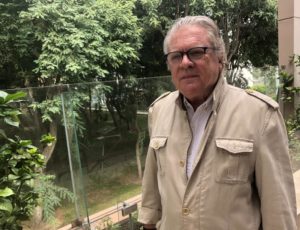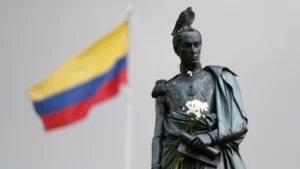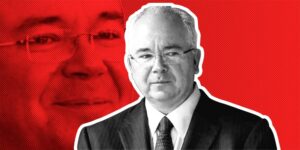Publicado en: Miami Herald
Por: Jim Wyss
Eight-year-old Reynier Urdaneta cradled a toy guitar and kicked around a blown-up surgical glove as he waited in the bowels of a massive hospital ship for a simple surgery — already once gone wrong in his native Venezuela — that might radically change his life.
He was one of hundreds of Venezuelans being treated by the USNS Comfort, a U.S. Navy vessel floating off the coast of northern Colombia this week. The ship’s medical mission is shining a spotlight on Venezuela’s collapsing healthcare system amid an economic crisis that has forced some 3 million to flee their country in recent years.

Once one of the region’s wealthiest and most medically advanced nations, Venezuela’s economic free-fall has had a devastating effect on the nation’s health. Ailments like polio, measles and AIDS are resurfacing. Even basic medicine can be hard to find, and hospitals struggle to stay open.
Reynier’s mother, Katiuska Urdaneta, said she scrimped and saved for years so that her son could have a hernia operation last year at a public hospital in Maracaibo, in western Venezuela. In theory, the surgery was free, but she said the hospital was so broke she had to buy all the supplies for the procedure, including sterilized water, scalpels, anesthesia, gauze, gloves and gowns. The surgery cost a small fortune, but less than two months later Reynier’s twin inguinal hernias — a painful condition when tissue or intestine bulges through the abdominal wall — reappeared.
As doctors on the U.S. Navy vessel fussed over her son this week, she said she couldn’t believe her luck: “I thought he was going to have to live with those hernias forever. There was no way we could have ever paid for another surgery in Venezuela.”

The ship has been stationed this week off the coast of Riohacha, a Colombian beach town less than 60 miles from the Venezuelan border and, these days, home to more than 50,000 Venezuelans.
Ariel Kaufman, a Venezuelan urologist who moved to Miami in 2014 due to growing insecurity in Caracas, said he’s been overcome with emotion — sometimes cried — as he’s connected with his countrymen.
“I’ve been practicing medicine for 25 to 30 years and nothing fills [my] heart and mind more than helping these people,” he said, as he waited for another batch of Venezuelan patients to be helicoptered onto the ship, “even if it’s with a small surgery or touching someone’s hand.”
Kaufman is part of a contingent of 14 Venezuelan doctors with the Venezuelan American Medical Association, VAMA, who are embedded on the Comfort for this leg of its journey.
Colombia’s northern coast, in La Guajira, is one of the most impoverished stretches of the country. Hunger, disease and a weak healthcare system were already an issue before the Venezuelan influx began. Colombian health officials say local hospitals have been overwhelmed by the migrants bringing a host of new problems.
Rafael Gottenger, a Venezuelan plastic surgeon who works in Miami and is VAMA’s vice president, said rates of tuberculosis, malaria, measles and HIV have soared in Venezuela. Even basic antibiotics are scarce.
“We have children dying from malnutrition at the hospital,” he said. “I’m not talking about a far away town. I’m talking about in the hospitals themselves.”
Kaufman said he treated a Venezuelan infant with bilateral hernias, much like Reynier’s, who also showed signs of malnutrition. “The hernia is congenital, but if you add to that the malnutrition, it makes it even harder,” he said.
On Thursday, a national survey of hospitals done by the Venezuelan nonprofit Medicos Por La Salud painted a grim picture. The study found that 51 percent didn’t have functioning X-ray machines, 60 percent were having electricity outages, and 70 percent were suffering water shortages.
The USNS Comfort — a converted oil tanker once called Rose City — is something of a medical marvel. It has 12 operating rooms, 1,000 beds (if you include the military bunks), a CAT scan machine and the ability to perform complex surgeries in seas of up to 20 feet. It can sail around the world one and a half times without refueling.
But on this mission the staff is largely focused on more routine but “high impact” procedures, said Kevin Buckley, the commanding officer of the ship’s hospital. Procedures like cataract surgery, cleft palate and hernia repair — although relatively simple — have an economic and social impact that goes far beyond the patient.
“The gift of sight is a huge economic multiplier,” he said, as the surgery often frees up family members and caretakers to work. “We’re a big white ship that brings hope and comfort.”

But the ship is also part of Washington’s geopolitical positioning in the region. The vessel was dispatched on this mission, “Enduring Promise,” in August after Defense Secretary Jim Mattis visited Colombia amid escalating tensions with Venezuela. The deployment announcement came two months after the Chinese announced that their medical ship, “The Peace Ark,” would go on an 11-nation tour that included Venezuela, Grenada and Ecuador.
When the Chinese vessel stopped in Venezuela in September, Vladimir Padrino, Venezuela’s defense minister, suggested it was a response to U.S. saber rattling. “This is how you undertake diplomacy in the world,” he said, according to The Associated Press, “with concrete actions of cooperation and not stoking the false voices of those who beat the drum of war.”
Venezuela and the United States have been at odds for years, but tensions have been rising as Washington has ratcheted up both targeted and financial sanctions. President Nicolás Maduro blames those measures for its economic collapse and says the restrictions are keeping it from importing desperately needed food and medicine. But it’s also clear that the oil-rich nation has seen its economy gutted by corruption and mismanagement.
Urdaneta said she and her family fled to Colombia seven months ago because her mother could no longer find HIV medication in Venezuela. In Colombia, it’s available but too expensive, she said.
“But we can’t go back to Venezuela,” she lamented. “Everything is getting worse there. It’s impossible to live.”

The Comfort stopped in Ecuador and Peru before arriving at Colombia, and it heads to Honduras Friday. The Riohacha stop has been complicated by the fact that the ship is 15 miles out at sea, only accessible via a 20-minute helicopter ride.
The missions are often criticized for their limited scope. While the Comfort’s doctors on land will see thousands of patients, they usually perform about 100 surgeries on the ship per stop. But the doctors say it’s unfair to measure their impact in sheer numbers.
Gottenger, the Venezuelan doctor, said that a relatively simple surgery to repair a cleft palate facial deformity might change the fate of the patient — and a nation. Children with deformities are often hidden away and denied opportunities in Latin America. The operation might allow them to go to school, get a job, even become president, Gottenger said.
“One patient could be someone important for the whole nation,” he said.
“Of course we’re not going to change the medical situation in Colombia or Venezuela with a ship coming in for 10 days,” said Kaufman. “It’s not the number of patients we’re helping. It’s that every patient has a story.”
















